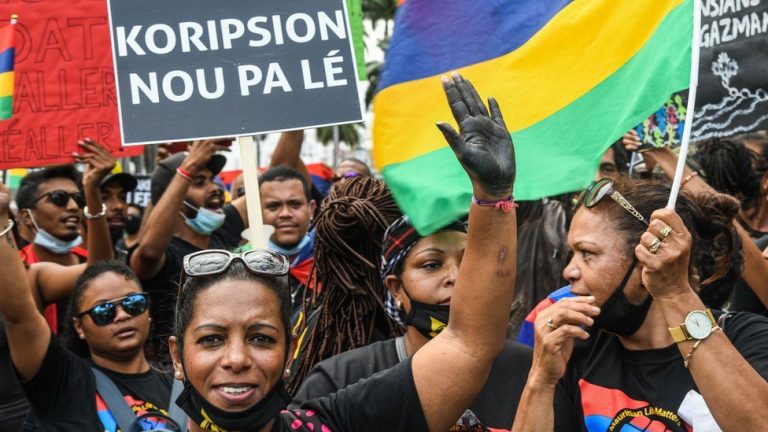The level of popular discontentment in Mauritius is high and riots could erupt at any moment, especially with more price rises expected.
In late-April, protests against the soaring cost of living erupted in cities across Mauritius. In Beau Bassin, Rose Hill, and the capital Port Louis, large groups of frustrated residents – particularly from low-income neighbourhoods – took to the streets.
These demonstrations were largely peaceful to begin with, but tensions rose sharply after Louis Dominique Seedeeal, an activist who had allegedly participated in an “illegal protest”, was arrested. In Port Louis, several hundreds of demonstrators defied Covid protocols as they congregated in front of the police headquarters to demand his release. The crowd was eventually dispersed with tear gas and batons, sparking violence in the surrounding area and fresh protests in other parts of the country. Riots spread and the police deployed armoured vehicles.
The unrest has expression of ethnic resentment among the Kreol minority and likened the events to the 1999 riots. This interpretation was partly prompted by a statement made by Prime Minister Pravind Jugnauth who suggested the protests had been provoked by the political opposition and alluded to opposition leader Rama Valayden’s “expertise” in riots. In 1999, Valayden organised a concert in support of the decriminalisation of cannabis. At the rally, the prominent Kreol singer Kaya smoked a joint on stage and was arrested. Kaya’s death in custody sparked four days of riots and inter-ethnic violence.
The 1968 Mauritian riots refers to a number of violent clashes that occurred in the Port Louis neighbourhoods of Cité Martial and Plaine Verte in Mauritius over a period of ten days, six weeks before the country’s declaration of independence on 12 March 1968. The riot was the result of communal conflict between the predominantly Christian creoles and Muslims over concerns arising from the country’s future political dispensation following independence.

Port Louis – Rioting, 1968.
The army viewed the riot as being the result of street gang rivalries between the Istanbul Muslim gang and the rival Texas Creole gang in Port Louis that had expanded and been exacerbated by political uncertainty due to the coming declaration of independence. Another gang of Creoles called Mafia joined forces with the Texas gang. The gang clashes led to the deaths of a Muslim and a Christian which sparked a spiral of violence between the communities.
However, the drawing of this parallel is misleading and distracting.
The present riots can be explained generally by the ever-rising prices, because it erupted in the neighbourhoods with the highest concentration of people in difficulty.
Mauritius’ economy has been hit hard by the Covid-19 pandemic and Russia’s invasion of Ukraine. The rupee has lost 20% of its value against the dollar since the start of 2020. The government has hiked up fuel prices four times in six months and increased public transport costs by 25-40%. Inflation is rising and the economy is still rebuilding after a 15% contraction of GDP in 2020 amid strict Covid restrictions.

This set of factors has left ordinary citizens struggling to make ends meet.
In response to the cost of living crisis, the Mauritian government has invested millions of rupees to subsidise basic foods and is expected to announce further supportive measures in its national budget in early-June. For now, however, many Mauritians believe the government’s actions have been insufficient and see the ruling Militant Socialist Movement (MSM) as out of touch.
A large majority of Mauritians say that the country is going in the wrong direction and that the economic situation will probably worsen over the coming year, a recent Afrobarometer survey indicates.
Mauritians perceive management of the economy as the top priority that the government should address, followed closely by unemployment and crime/security. COVID-19 also features on the list of the most urgent problems to be addressed.
The opposition has tried to capitalise on this. It has called for elections and tax cuts, and it organised a motion of no confidence in the government that was voted down on 13 May. The opposition party Linion Pep Morisien (LPM) also called on drivers to participate in a “go slow” protest through the streets of Port Louis in response to the latest 10% rise in fuel prices.
People and in particular the most vulnerable therefore expect government to take urgent corrective actions now to alleviate their present existential difficulties and distress.
government mainly came forward with nothing better than a subsidy of Rs 150 million to maintain the prices of seven products (canned fish, canned tomatoes, cheese, edible oil, margarine, milk powder and pulses) at the current level up to 30 June 2022. This is a far cry from the billions of Rupees of public funds advanced in total opacity from the Mauritius Investment Corporation to bail out distressed Corporate conglomerates and private companies or the wide range of support measures granted from public funds to smart city projects, the tourism and sugar cane sectors and other sectors to keep them afloat.
The current economic crisis requires competent currency stabilizing measures to protect consumers, a more rigorous price control by the authorities and an unequivocal solidarity from commercial partners, supermarket companies and retailers to help consumers tide over the crisis.



